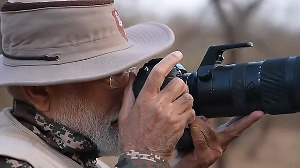The first cabinet meeting of Bangladesh Prime Minister Sheikh Hasina's newly-formed government has ordered intensified anti-terror vigil in the country, while asking security agencies to "maintain peace and stability at any cost".
"We have reviewed the overall law and order situation of the country and asked law enforcement and intelligence agencies to remain vigilant," Commerce Minister retired colonel Faruk Khan told media-persons emerging a from a two-hour long cabinet meeting with Hasina in the chair late on Wednesday night.
The meeting noted occurrences of a few violent incidents after last week's general election and asked concerned agencies to "maintain peace and stability at any cost," he added.
The 32-member cabinet meeting was held a day after Hasina's Awami League-led government was ceremonially installed and the ministers joined their offices with promises to fulfill their electoral pledges.
The country's new foreign minister Dipu Moni had said the government planned to set up an "effective" regional body to fight terrorism as she pledged to increase cooperation among its neighbours in tackling the menace.
"Militancy and terrorism are not confined to geographical boundaries, that's why we must take effective steps to fight them in consultations with our neighbouring countries," underlined Moni, the first woman to hold the foreign minister's post in the Muslim-majority nation.
The cabinet also decided to provide all privileges of a minister to Fakhruddin Ahmed, former chief adviser for a year
"The meeting also decided to provide all privileges of a minister to the former chief adviser of the past interim government Dr Fakhruddin Ahmed for a year, including security, health care and accommodation," the commerce
minister said.
Ahmed's interim government was installed with crucial military support after the January 11, 2007 proclamation of
the state of emergency, amid heightened political tension.
The cabinet also decided to lower the price of diesel used for irrigation and increase subsidies for fertilizer, two
major farm inputs and Hasina directed the ministers concerned to take immediate measures to bring prices of everyday essentials within the reach of consumers.
Directives were issued to reinstate the system of fertiliser distribution of the Awami League regime of 1996- 2001, when the crucial agriculture input was sold on open markets through dealers.
The system was later stopped by the subsequent Khaleda Zia's four-party government. A major election pledge of the Awami League-led grand alliance was to bring down the price of essentials.






 © 2025
© 2025